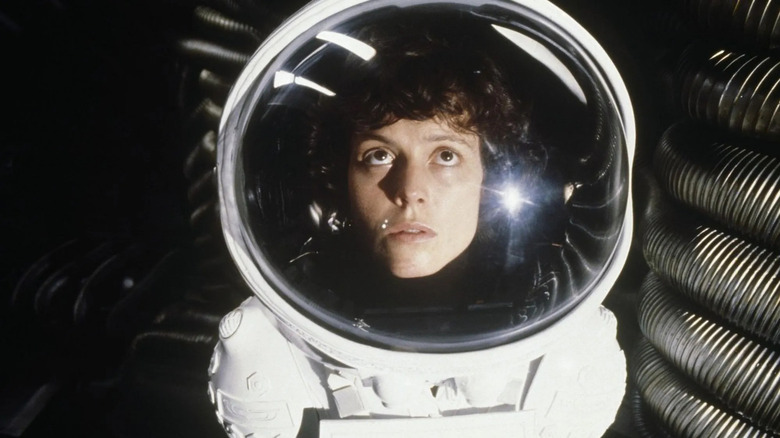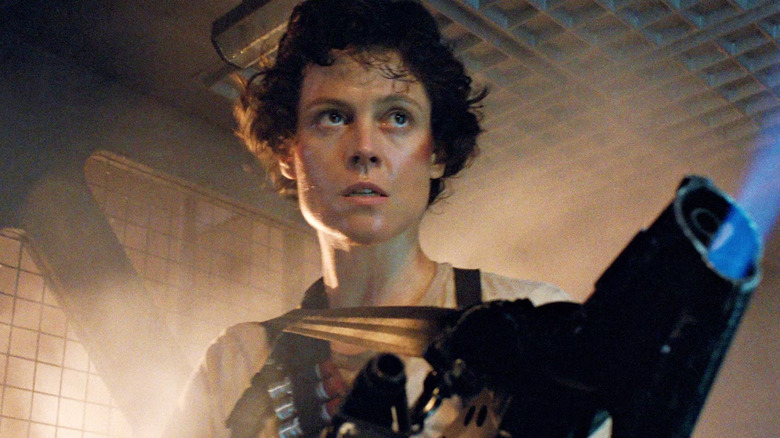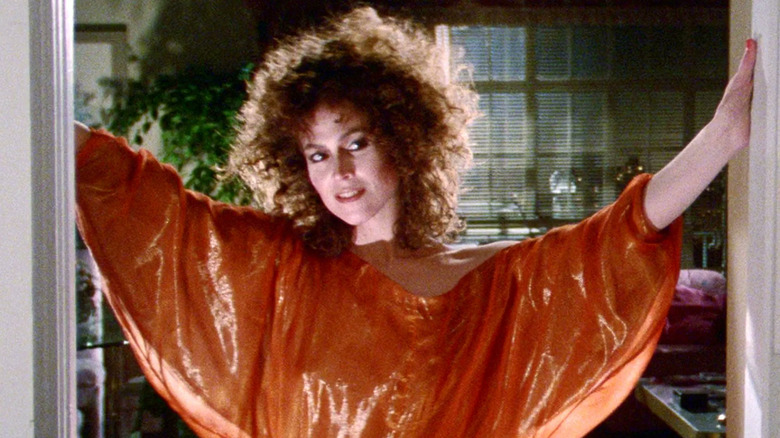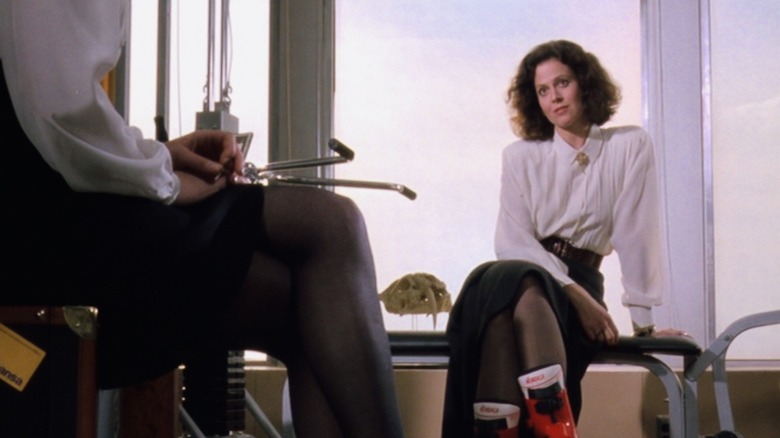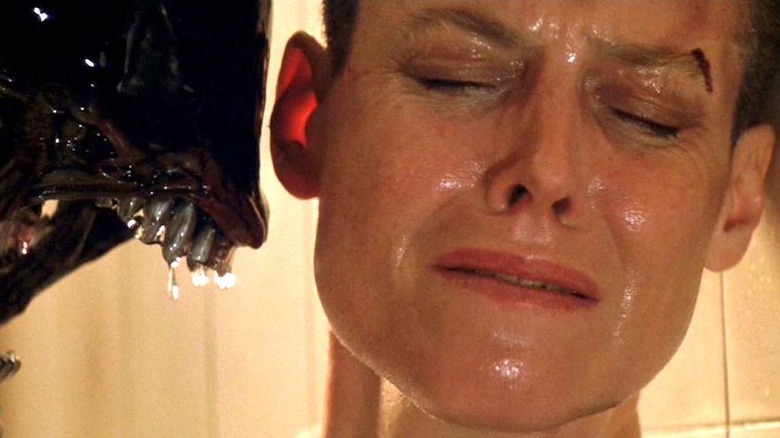Sigourney Weaver Is The Best Actor Ever
Sigourney Weaver is formidable. Intimidating. When she steps in front of a camera, she instantly becomes the most powerful presence in the scene, even if her character isn't. She projects fierce intelligence, and rightfully seems to disdain every single character in her orbit as less than. She's devoured the daunting likes of Bill Murray, Mel Gibson, and Gene Hackman without breaking a sweat. At 5'11", Weaver towers and struts with Amazonian grace. She's as captivating as she is impenetrable. But then she lets the facade crack, and you realize, even when she's playing an ice queen like Katharine Parker in Mike Nichols' "Working Girl," that these forces of nature are concealing a mess of neuroses.
In a less patriarchal world, Weaver would've been the female equivalent of Harrison Ford. She's a movie star top-to-bottom, but she's long worked against society's view of determined, independent women. There have been films that allowed her to flesh this out, to explore how it feels to be underestimated by weak and/or idiotic men. She's played the femme fatale on a few occasions, but there's a power imbalance when she does. Kathleen Turner struggled with this, too. They call these types "maneaters," but what's a smart, sexually assured woman to do when matched up with dopey dudes? These guys have it coming.
There's also a firm dignity to Weaver's characters. It shines through in the "Alien" films, as well as Ivan Reitman's "Dave." She exists above the fray, and abhors getting dragged into it. She knows better, and she knows just about everyone around her doesn't. This was our introduction to Weaver, and she's smartly played off this quality for most of her film acting career.
The breakout
"How do we kill it?"
Tom Skerritt's Dallas is the ostensible protagonist of "Alien," but he's a company man. He's the captain of the Nostromo, a commercial space freighter that is unexpectedly awakened from cryosleep to investigate a distress signal on a far-off moon. Ridley Scott, working from a screenplay by Dan O'Bannon and Ronald Shusett, upends the intergalactic heroics of "Star Wars" by slow-burning the narrative; he leads with atmosphere and lets the characters assume their conventional places. Dallas seems capable, so we initially expect him to steer his crew (or what's left of them by film's end) clear of peril.
But he's a company man.
Weaver's Ripley works for the company, but she isn't willing to die for their vague dictates. When they take on the xenomorph and realize its predatory potential, she asks the question Dallas won't explicitly entertain until it's too late. If Ripley had her way, she wouldn't have let Dallas and Lambert (Veronica Cartwright) out of the airlock with the face-hugger afflicted Kane (John Hurt). But now that this beast is onboard, her mission is to kill or be killed.
On a basic level, Ripley is a final girl à la Jamie Lee Curtis's Laurie Strode in "Halloween." To that end, "Alien" is a gussied-up slasher flick. And, yes, we do get the fetching sight of Weaver battling the xenomorph in oddly skimpy underwear. But Weaver laid the groundwork that elevates Ripley above shrieking victim status. By the time we watch her go toe-to-toe with crewmates Dallas, Brett (Harry Dean Stanton), and Parker (Yaphett Kotto), we expect her to outsmart the xenomorph. Weaver's sex appeal isn't beside the point, but unlike many slasher protagonists, she's in control of her bodily exploitation. Ripley's proactive. She's going to expel this annoying creature from the ship, and then she's going to catch a long stretch of z's with her cat until they reach Earth. No horror hero has ever been more relatable.
The career
Weaver nearly bailed on the prestigious Yale School of Drama in the early 1970s. She told the New York Times they deemed her "talentless," and cast her in thankless roles. But her classmates Christopher Durang and Wendy Wasserstein were enchanted by her presence, and gave her meaty roles in their cabaret shows. Durang was particularly supportive. He cast her in his absurdist plays "The Nature and Purpose of the Universe" and "Das Lusitania Songspiel," which highlighted her flamboyant gifts.
When you hire Weaver, you're getting a thoroughbred actor who wants to sprint. This is the best problem a director will ever face. Getting less is so much easier than coaxing out more. You don't have to draw a performance out of Weaver; you've just got to rein her in. Even then, if you've cast Weaver, how do you not let her gallop?
After the blockbuster success of "Alien," Hollywood fumbled the ball. Her brainy demeanor was used against her in Peter Yates' solid "Eyewitness," and she was utterly wasted as Chevy Chase's love interest in William Friedkin's godawful "Deal of the Century." Weaver and Mel Gibson melted the screen with their sexual chemistry in Peter Weir's "The Year of Living Dangerously," but by that time she was already making a career out of being the most magnetic element of every movie in which she appeared.
Reitman's "Ghostbusters" paired her with Bill Murray, which was a comedic masterstroke. Murray had a habit of dominating his love interests up to this point, but Weaver was having none of it. When she calls Murray a game show host, he's wounded. Murray's ingratiating enough that we buy their romance, but she is, in the film's parlance, the keymaster. She deserves better, and demands better of Murray. And he does, finally, rise to the occasion.
The career part II
Weaver earned a Best Actress Oscar nomination for her portrayal of driven primatologist Dian Fossey in Michael Apted's "Gorillas in the Mist," but Anna Hamilton Phelan's screenplay strands her in an oddly bland biopic. Weaver's Fossey is a ferocious protector of apes, but there's an edge of madness to this character that is left unexamined. She conveys the righteous savagery of this woman, but the film leaves her raging in a vacuum.
I far prefer Weaver in "Working Girl," where we watch her ambitious corporate animal get outmaneuvered by her administrative assistant (Melanie Griffith). Katharine Parker isn't a villain per se. She had to scrap and use her feminine wiles to climb the corporate ladder, and, to an extent, the film does her dirty by pitting her against Griffith's Staten Island underdog. In 1988, when the film was released, both women were underdogs, and subject to the same discrimination. The script doesn't necessarily convey this, but Weaver does, loud and clear.
Weaver has, alas, reached that age where Hollywood shamefully doesn't know what to do with her. James Cameron, who directed her to a Best Actress nomination in "Aliens," does get her, and she responded with a revelatory portrayal of a Na'vi teenager in "Avatar: The Way of Water." Performance capture work can be difficult to quantify, but, if you watch the behind-the-scenes work, Weaver is conjuring the soul of a young woman. It's a middle finger to Hollywood sexism that wants her to play grandmothers until the grave.
But Weaver has always been defiant. In fact, she almost cratered her career by insisting on a dismal end to the franchise that launched her.
The defining performance
Despite its nightmarish production, David Fincher's "Alien³" could've been a commercial lay-up. Six years after Cameron's "Aliens," audiences were primed for more butt-kicking Ripley. Instead, the producers handed the keys over to a series of downbeat auteurs who believed the series had to end on a dour note. And, amazingly, the studio went along with it.
As depicted in Charles de Lauzirika's behind-the-scenes documentary "Wreckage and Rage: Making Alien 3," Fox signed off on a grim sequel to the rollercoaster ride that was "Aliens." This would never, ever happen in modern Hollywood. Amazingly, Weaver shaved her head and committed to an installment in which her character at long last found herself impregnated with a xenomorph. Before she can contend with that, she has to help a colony of prisoners kill off the beast that hastened the death of her newfound lover Reese (Michael Bienh) and her hastily adopted daughter Newt (Carrie Henn).
This should've been Weaver's swan song to the franchise. Ripley and the xenomorph are inseparable. For reasons she cannot understand, this is her cross to bear. But she cannot allow this alien to fall into the exploitative hands of Weyland-Utani. Due to this, Fincher's film is a dirge. At no point do we believe Ripley is surviving this movie, and Weaver drives this home in every scene. Once again, she's the smartest person in the room, but she can't outthink this predicament. She will die. But she can fight like hell to die on her own terms.
We often call performances like this "brave," but this is a rare feat of artistic integrity. Weaver could've hedged her commercial bets, but she decided to rid herself of this box-office albatross. Ripley in "Alien³" is the inverse of the character in "Aliens." She's lost everything she fought for and yearns for the grave. Watching Weaver navigate these dire waters is like watching a terminal patient determine, as best they can, their final days. It's an excruciatingly beautiful performance, all the more so because we're not used to watching Weaver surrender. And yet, when she falls back into the furnace, you want to cheer. Ripley has denied a nefarious industry access to a lethal chemical weapon, and, best of all, found eternal freedom. Even in death, Weaver wins.
